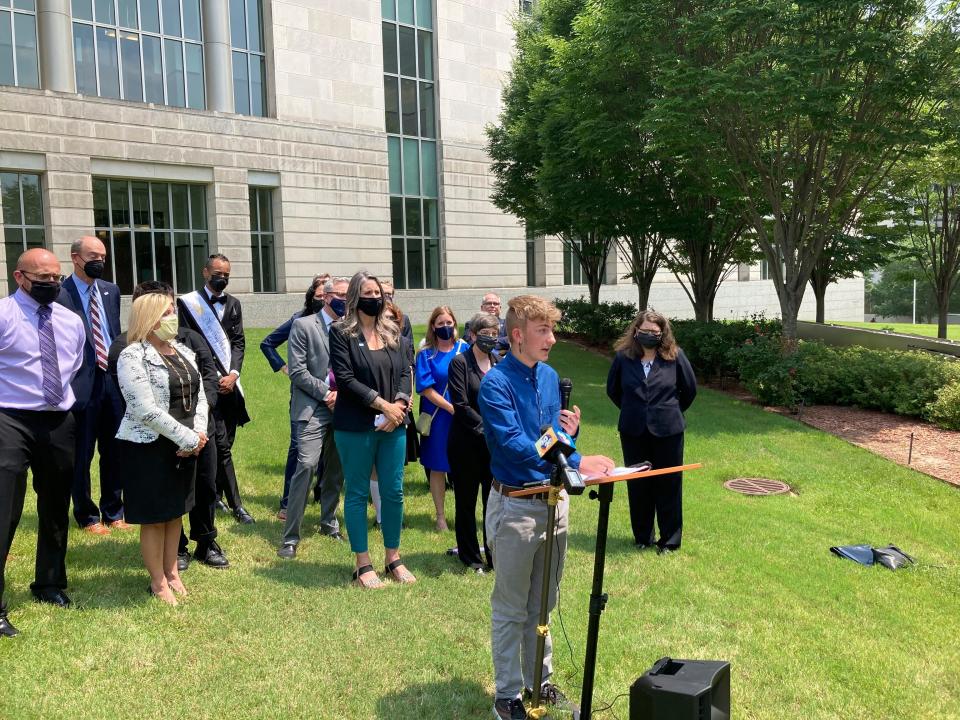Florida families file suit challenging state's ban on gender-affirming care for youth
Four families are suing the state of Florida over its ban on gender-affirming care for youth, saying it unlawfully strips them of the right to make informed choices about their children's medical treatment.
“These kinds of rules are taking away the ability of parents to obtain care for their children for a recognized medical condition,” said Shannon Minter, legal director for the National Center for Lesbian Rights, which filed the suit along with GLBTQ Legal Advocates & Defenders, Southern Legal Counsel and Human Rights Campaign.
Minter said it was crucial to fight the ban in a state that continues to be a high-stakes political battleground.
“It’s really important to stand up to these measures the minute they’re enacted before they have a chance to be enforced,” he said. “Even in very conservative places, people are recognizing how extreme and potentially harmful these measures are.”
Simone Chriss, director of Southern Legal Counsel’s transgender rights initiative, called such bans politically motivated, targeting a vulnerable population.
“We’ve seen an all-out assault across the country on the rights of transgender folks, and in particular transgender youth,” she said.
When did Florida's ban take effect?
In November, Florida’s medical boards approved a rule advocated by Republican Gov. Ron DeSantis that bars transgender youth from receiving hormones or surgeries to treat gender dysphoria, which is discomfort or distress caused by a discrepancy between a person’s gender identity and sex assigned at birth.
The ban went into effect March 16.
The Florida legislature, meanwhile, is considering bills that would not only codify the ban but extend it to youths already receiving such care, a move Chriss called “really devastating.”
Bans on gender-affirming care have been enacted by law or administrative action in at least 10 U.S. states. While proponents see them as a way to protect youth, such restrictions have been widely criticized by physicians and medical associations, including the American Academy of Pediatrics, the American Medical Association and the American Academy of Child and Adolescent Psychiatry.
This week, the Human Rights Campaign, an LGBTQ+ civil rights organization based in Washington, D.C., published a map showing that just over half (50.4%) of transgender youth nationwide between 13 and 17 years old have lost or are at risk of losing access to gender-affirming care.
“LGBTQ+ people are living in a state of emergency,” said Jay Brown, a senior vice president for the organization. “…. We must fight back against extremism and hold anti-LGBTQ+ politicians accountable for bullying children and terrorizing our families.”
Families say the ban is unfair
The suit names as defendants Joseph Ladapo, Florida’s surgeon general, as well as the state’s Board of Medicine and Board of Osteopathic Medicine.
“Defendants cannot demonstrate any rational basis, much less an important or compelling one, for the transgender medical bans which prevent transgender adolescents from getting safe and effective medically necessary healthcare,” it reads.
The families, identified by pseudonyms to protect their children’s privacy, said in a press release that gender-affirming care is necessary for their children’s emotional and physical wellbeing.
“I know everyone may not understand what it means to have a transgender child, but taking away our opportunity to help our daughter live a healthy and happy life is cruel and unfair,” said the mother of a 10-year-old who is among the plaintiffs.
Also among the plaintiffs are an 11-year-old and her military parents who moved to Florida when the girl’s father was stationed there as a U.S. naval officer.
“We’re proud to serve our country,” the girl’s mother said, “but we are being treated differently than other military families because of a decision by politicians in the state where we are stationed.”
Chriss said the four groups plan to file a subsequent motion for preliminary injunction that would halt the Florida ban while the case proceeds so that affected youth can continue to receive care. Federal judges have blocked similar bans in Alabama and Arkansas.
Preventing care 'not the answer'
Last April, more than 250 Florida doctors signed a letter criticizing the ban. While more research is needed to improve care for transgender and gender-diverse youth, they said, “taking away social support and medical care is not the answer.”

Chriss said she’s been impressed by her clients’ resilience and said organizations like hers would continue to fight for them and other families whose children are affected by the ban.
“It’s incredible to see their tenacity but also devastating to watch clients crumbling under the weight of these attacks,” she said. “Children are terrified – but a lot are just angry that these legislators and people in positions of power, who have an obligation to protect and keep them safe, are spending an insane amount of time and energy hurting them.”
Dig deeper:
Should transgender youth have access to gender-affirming care?
Texas governor orders state agency to treat gender-affirming care as child abuse
This article originally appeared on USA TODAY: Transgender youth: Families challenge Florida ban on medical care


